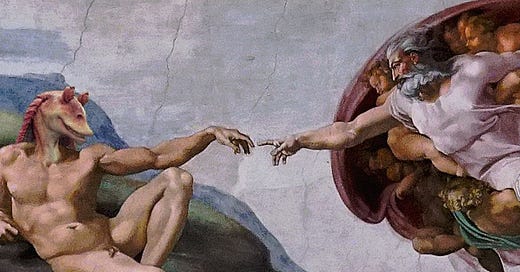It’s been a rough few years for TV made by people I love. Several times, one of the gods of television has chosen to descend from Mount Olympus with a new creation, only to trip on their first step, slide face-first down the mountain, and then wet themselves. I don’t want to get specific, because I still sort of work in TV and am also a coward, but consider these shows:
There was the one where I watched six full episodes thinking “this has to get better,” but it never did;
There was the one where the trailer looked so bad that I decided it was only worth a “watch while folding laundry” trial period, but before I’d even matched up my socks I was back to watching 90 Day Fiancé;
There was the one that was so bad I felt sorry for the successful, good-looking, extremely-wealthy actors involved;
There was the one that made me wish that the main person had just stayed away instead of making me witness the Fat Elvis in Vegas period of their career.
These shows sucked so hard that they changed how I see the world. Very recently, I had a 19 year-old-art-school-brat’s view of the creative process; I thought that if the suits would just get out of an artist’s way, good things would follow. But after these shows, I can’t think that anymore. Clearly, giving a blank check to a talented person doesn’t work every time.
Why not? I don’t know, but I have some guesses. The theories below aren’t mutually-exclusive, and they’re probably all at least a little bit true. They seem worth thinking about, because we all have jobs and we all make stuff, so it might help to reflect on why sometimes the stuff is good, sometimes it’s bad, and sometimes it’s Jar Jar Binks.
THEORY 1: A star can get a bad idea made
Imagine making this movie pitch:
“The protagonist is a clown — what’s more likable than a clown? Anyway, he’s a clown, and a German clown — so we’re already talking Laugh City here — but before you giggle yourself right out of your chair: It’s set during the Holocaust. The clown gets sent to a Nazi prison camp, where he becomes very close with several kids. Yes, the clown in the Nazi prison camp befriends kids — why is everyone getting weird? Should I keep going? I’m just going to keep going. Anyway, our hero clown gets close with the kids, and before you think “Oh, it’s a humor-amongst-the-bleakness, Life Is Beautiful-type tragic comedy,” let me just tell you that the film ends with the clown leading a group of children to their death.
I don’t own the rights to the story.”
You couldn’t get that movie made, I couldn’t get that movie made, but in the early ‘70s, Jerry Lewis did get that movie made. I’m referring to the infamous The Day the Clown Cried, which was meant to be Lewis’ debut as a serious actor and director. The movie was shot but never released due to a dispute over the rights and also due to it being, by all accounts, one of the worst, most tasteless pieces of shit ever made. It’s only been seen in glimpses, which means the world has been deprived of Jerry Lewis doing pratfalls for extremely Aryan-looking children (they filmed in Sweden), and also moments of cinematic gold like this:
Producers and studios back people more than ideas. They almost never throw money at an idea from an unknown — they want someone with a proven track record attached. I’ve heard this called “schmuck insurance”. It’s a form of the old Wall Street adage: “No-one ever got fired for buying IBM”, which means that if you make the safe play, you’ll probably keep your job even if it all goes to shit. The propensity to play it safe and cover your ass is, I think, one of the most powerful forces on Earth.
THEORY 2: When you get big, nobody says “no” to your bad ideas
This is a close cousin of Theory 1, but it’s more about individual ideas once production has already begun. If you think I was going to say “no” to any idea John Oliver had when I first got hired at Last Week Tonight, you need to get your head examined; I had spent nine years in the standup comedy minor leagues and was determined not to go back. Now, imagine that your boss is George Fucking Lucas, and he says “I’m considering a character that’s a frog-faced space rabbit, and he mostly does pratfalls in the middle of battle scenes, and he speaks in a patois that even people in the ‘90s will consider pretty racist.” Do you say “Sounds real bad, Extremely Successful Filmmaker Who Is Also My Boss”? No, you say “Another home run, sir!” And then, your boss’ minstrelry-adjacent space rabbit becomes the go-to reference for a terrible movie idea for the next several decades.
If you’re a big-shot, nobody in the room is likely to contradict you. And there might not even be anyone else in the room; I’m convinced that Aaron Sorkin’s phenomenally-strange Studio 60 On the Sunset Strip — which has been discussed several times in this newsletter and will probably be discussed several more — was written alone in a fit of drug-induced hysteria. But Sorkin was extremely hot after his West Wing success, so no-one said “Sir, I love this storyline in which a comedy show gets mixed up in a hostage negotiation involving a shadowy Asian syndicate called Trask Security (n.b. actual plot!). But maybe we could tweak it a little so that it’s a bit less, you know…obviously written by a guy on mushrooms.”
Once Sorkin lost some heat, he went back to writing great stuff like Moneyball and The Social Network. That might be because his bad ideas became less unassailable, leaving only the good ones. Or maybe he just got sober; one of my theories should probably be “when you‘re rich, you can afford really good drugs.”
THEORY 3: They’re tired
When you’re young and hungry, you work like a maniac. My early years as a comedy writer helped me understand why the SNL writers of the ‘70s did cocaine; when your options are: A) A good-paying TV job, or B) Doing sets at the Laff Factory for $15 payable in mozzarella sticks, you work until your brain explodes. Of course, all of us at Last Week Tonight were far too big of pussies to score actual cocaine, so we made do with cold brew coffee and neglecting our personal relationships.
What’s the incentive when you’re already rich? Devotion to one’s craft? Please — let’s be adults here. One thing success should earn you is the ability to work without being driven like a plow horse. Plus, you’re older, and past a certain age, avoiding anything taxing becomes a top priority. To wit: I'm 41 and I drive a truck that has the heat/AC slider held into place by a Jolly Rancher (right size + it’s sticky = perfect implement) because I can’t be bothered to get it properly fixed.
THEORY 4: We might have overestimated their talent to begin with
Stick with me here: There are several Kuiper Belt objects whose orbits overlap with Neptune. Pluto, for example — once a planet, but famously downgraded in 2006 to “shit planet” — crosses Neptune’s orbit. But, Neptune and Pluto have 3:2 resonance; Pluto completes exactly two orbits in the time it takes Neptune to complete three. So, they’re never in the same place at the same time. In fact, every object that crosses Neptune’s orbit has a similar ratio — 1:1, 2:3, 3:5, and so on.
How did this happen? Simple: attrition. There used to be many objects that crossed Neptune’s orbit, but Neptune sucked in all the ones that had the “wrong” orbit. The objects we observe aren’t in harmony because it was always meant to be that way; they’re in harmony because if they didn’t have their timing just right, they wouldn't exist.
This is a long way of saying that we probably underestimate the role of luck in conferring success. We might think of great artists as preternatural geniuses, supernovas of creativity whose talent can’t be denied. But it’s probably more accurate to think of them as people who were capable of doing great work, but they still needed — wait for it — the planets to align. If you take ten talented people, it’s likely that one of them will eventually have the right idea in the right place at the right time and take off. But they weren’t predestined to take off; they just did. And the other nine people didn’t. Talent alone doesn’t lead to great work; it’s talent plus circumstance.
THEORY 5: Nobody can do it every time
Theory 4 argues that great work isn’t proof of preternatural talent; Theory 5 argues that even the most talented among us won’t hit a home run every time up to bat. Consider Mike Judge: He created Beavis and Butthead, King of the Hill, Silicon Valley, Office Space, and Idiocracy.1 That’s an astounding hit list; he has to be considered one of the great comedy minds of his generation. But even he has the occasional flop; The Goode Family, for whatever reason, didn’t work.
The hit-and-miss reality of TV and movies makes even more sense when you consider that nobody, not even George Lucas, is in total control of any production. TV and movies are team sports. Many pieces are moving in concert, and they’re not pieces: They’re people. Each person is experiencing their own, personal, boom-and-bust cycle, and the volatility is enhanced by the fact that everyone is reacting to each other. Lorne Michaels might be the best group-dynamic manager in the history of comedy, but even he couldn’t stop the complete staff meltdown that happened during the ‘94-’95 SNL season. Even if a person with infinite talent did exist — and they probably don’t — when you force that person through the realities of a collaborative process, you’re going to get the occasional Ladykillers or Kingdom of the Crystal Skull.
THEORY 6: The team’s not as good as it used to be
Theory 3 posits that people can’t be at their peak forever; Theory 5 points out that the person at the top isn’t the only one who matters. So, combine the two: What if the whole team gets bad at the same time?
Once a person has been in show business a while, they tend to have “their people”. Think of how Scorsese and the Coen Brothers have “their” actors; the same thing happens at the staff level. Sometimes, this works incredibly well; the Better Call Saul staff basically is the Breaking Bad staff, and both shows are amazing. But I could also imagine sticking with your team leading to a staff full of tired people firing at 70 percent. Speaking for myself: Though I was young and hungry in the early years of Last Week Tonight, by season six I was tired, married, and writing those lame “[person X] looks like [thing Y] fucked [thing Z]” jokes that always work no matter what.

It might also be harder to jolt a writers room out of complacency than it used to be. Rooms are getting smaller across the industry; that means fewer new hires. Hiring processes also give increasing weight to race and gender, and an emphasis on ascriptive traits means a relative de-emphasis on writing ability. Plus, ways of identifying new talent continue to be highly flawed, and attempts to provide pathways for new talent by making processes less subjective have lost momentum. The worst case scenario is that you end up with a room where there aren’t young people pushing the old people, so the old people coast along in third gear.
Those are my best guesses as to what’s going on. But, I’m curious about what other people think. So, here’s a poll that will surely settle everything: Which factors do you think are most responsible for good artists making bad art? Please vote for EXACTLY TWO, and the results will answer the question conclusively and nobody will argue about it ever again.
What are the two biggest reasons why good artists sometimes make bad art?
1. Even their bad ideas get made [VOTE FOR THIS]
2. Nobody tells them "no" [VOTE FOR THIS]
3. They get old and tired [VOTE FOR THIS]
4. We overestimated their talent to begin with [VOTE FOR THIS]
5. Nobody can hit a home run every time [VOTE FOR THIS]
6. The team around them got worse [VOTE FOR THIS]
Good artists making bad art might not be a trend. We might just be witnessing that great, underappreciated force of the universe: statistical variance. If there’s a theme in this post — hell, if there’s a theme in this newsletter — it’s that none of us are in control or even know what the hell’s going on. And there's still good stuff out there. Plus, there are rumors that Jerry Lewis’ pratfall-based telling of the Holocaust will finally be released in 2024. So, at least we’ve got that to look forward to!
Some might consider it odd for me to put Office Space and Idiocracy on my “hit list”, since they were both box office flops. But both became a cult classics, and both are hilarious, so I’m counting them as “hits”.







How about Theory 7: You can't fight City Hall?
There may just be periods of history where the creation of art is so constrained that excellence can't get any air. I doubt I'm blowing any minds if I say that most everyone - artists, studios, benefactors, museums, whoever - is more reluctant than they've been in generations to produce anything but pablum. There's just no percentage in it right now.
I wonder if there's any real way to climb out of it. The fact that every single interesting, novel, and boundary-pushing work of art in human history is available to virtually the entire human race in an instant probably argues against it. You could spend the rest of your life and never want for exciting art. That niche is filled by streaming services, Amazon, the internet. Why take any risks with new stuff?
I'm on team "No one tells them no" along with "they're free to ignore all criticism and suggestions." Studio 60 was very revealing on this point -- in addition to the insane mushroom-induced war fantasy plots, it was about a genius head writer (Matt) and his worthless writing staff that never got sketches on the air. The staff eventually quit to make a doomed sitcom called Peripheral Vision Man, and Matt had to write the entire show by himself.
Sorkin is prolific and talented, but he obviously has some control issues that don't serve him. It seems like folks tried to reign him in on West Wing (leading to his departure) but as you observed, he obviously wrote Studio 60 by himself on drugs. If there was a paid writing staff, he rejected all of their ideas and then went back to his office muttering about incompetent amateurs -- and then put that frustration right into the script, further demoralizing the staff. I mean, imagine pitching an idea, and then Sorkin not only rejects your idea, the next episode is about the put-upon head writer blowing off steam about the untalented hacks on his writing staff.
This is why some of Sorkin's worst writing is about race and gender topics. He clearly writes those scenes himself, without soliciting feedback from anyone who is an actual woman or Black person, and the results are cringe city.